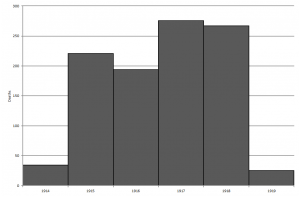
Lancastrians killed in the First World War
The graph above shows the number of Lancastrians who died in each year. In many ways, each year was different. 1914 saw relatively few deaths and they were concentrated among men who were professional soldiers before the War started, especially from the 2nd Battalion of the King’s Own Royal Lancaster Regiment.
1915 must have shattered any illusions that the War was going to be easy. April and May saw the Second Battle of Ypres which gave Lancaster its worst two months of the War. 121 men died, many of them from the 1st/5th Battalion of the King’s Own, a Territorial Force battalion that consisted of part-time soldiers from before the war and early volunteers after war broke out. Lancaster never had a formal ‘pals’ battalion, the 1st/5th in many ways served this role. The Battle of Loos also affected Lancaster badly. Lancaster’s worst two days of the War occurred in 1915: nineteen men killed on both the 8th May 1915 during Second Ypres, and on the 25th September, the first day of the Battle of Loos.
1916 started relatively calmly until the outbreak of the Somme campaign on the 1st July, after which casualties were heavy for several months. Although the first day of the Somme is remembered as the worst day in the history of the British Army, it was not the worst day for Lancaster. Ten men were killed. The worst day of the Somme campaign for Lancaster was the 15th August when twelve men were killed. This was again largely down to the 1st/5th taking heavy casualties.
1917 was the worst year of the war for the town with 270 deaths. While the major battles of that year – Arras, Third Ypres (Passchendaele) and Cambrai – took heavy tolls, it is noticeable that the intensity of the War had increased and more casualties seem to have been occurring across the board.
1918 was almost as bad a 1917 with major spikes in casualties in the Spring, as a result of the German Spring Offensive, and in the late summer and Autumn as a result of the Hundred Days Offensive which finally led to the end of the War on the 11th November.
Despite the War ending in November 1918, men continued to die. The last Lancastrian recorded as dying on the Lancaster War Memorials site is Alfred Tyldesley of 39 Perth Street who died of wounds on the 18th August 1921. He is buried in Lancaster Cemetery.